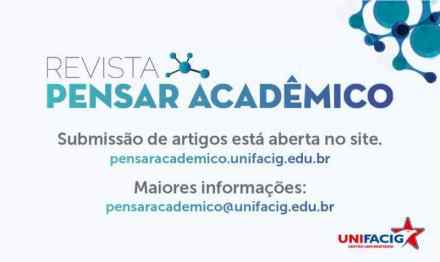A FORMAÇÃO DA (O) PSICÓLOGA(O) PARA ATUAR NO CONTEXTO EDUCACIONAL APÓS PANDEMIA
Pensar Acadêmico
A FORMAÇÃO DA (O) PSICÓLOGA(O) PARA ATUAR NO CONTEXTO EDUCACIONAL APÓS PANDEMIA
Autor Correspondente: LINCCON FRICKS HERNANDES | [email protected]
Palavras-chave: Educação; Psicologia; Covid-19; Psicologia Educacional
Resumos Cadastrados
Resumo Português:
A partir do contexto da pandemia da COVID-19, o manuscrito se debruça sobre debates em relação ao contexto educacional da psicologia enquanto ciência e profissão na contemporaneidade. Atravessado por fatores sociais, culturais, históricos, geográficos e políticos, a psicologia brasileira é constituída a partir de vieses de adaptação, normatização e docilização de corpos. Esse contexto aparece contemporaneamente com a crescente mercantilização da educação, afetando também a psicologia na sua interface com os debates e atuações educacionais. Através de referenciais interdisciplinares trazidos no texto, aposta-se, como bússola ética frente a tantos retrocessos, na direção do cuidado, de uma escuta política, dentro de uma clínica ampliada. Enseja-se assim uma derrubada do lugar mercantil e historicamente capturado da psicologia escolar, a fim de produzir corpos singulares, cada vez mais libertos e potentes. Fica evidente que o psicólogo precisa preocupar-se com sua própria formação, de modo que seja capaz de refletir criticamente sobre a complexidade da realidade que viemos enfrentando e, ao mesmo tempo, construir, juntamente com suas equipes de professores e corpo de alunos, possíveis saídas e formas de cuidado a esses problemas agudizados com a pandemia. O psicólogo precisa se preocupar primeiramente com de que lugar ele pensa e vê sua atuação, em que critérios ético-políticos se baseia, sendo menos um técnico incumbido de solucionar problemas e muito mais um propositor e promotor de concepções educacionais condizentes com as singularidades de nossa realidade, nossas culturas, de nossos estudantes e professores, com as problemáticas de nossa constituição social e histórica.
Resumo Inglês:
From the context of the COVID-19 pandemic, the manuscript focuses on debates in relation to the educational context of psychology as a contemporary science and profession. Traversed by social, cultural, historical, geographical and political factors, Brazilian psychology is constituted from biases of adaptation, normalization and docile bodies. This context appears contemporaneously with the growing commodification of education, also affecting psychology in its interface with educational debates and actions. Through interdisciplinary references brought in the text, we bet, as an ethical compass in the face of so many setbacks, in the direction of care, of a political listening, within an expanded clinic. Thus, an overthrow of the commercial and historically captured place of school psychology takes place, in order to produce singular bodies, increasingly free and powerful. It is also evident that psychologists need to be concerned with their own training, so that they are able to critically reflect on the complexity of the reality we have been facing and, at the same time, build, together with their teams of teachers and student bodies, possible solutions and ways of taking care of these problems exacerbated by the pandemic. The psychologist needs to be concerned first with where he thinks and sees his performance, on what ethical-political criteria he is based, being less a technician in charge of solving problems and much more a proposer and promoter of educational concepts consistent with the singularities of our reality, our cultures, our students and teachers, with the problems of our social and historical constitution.

